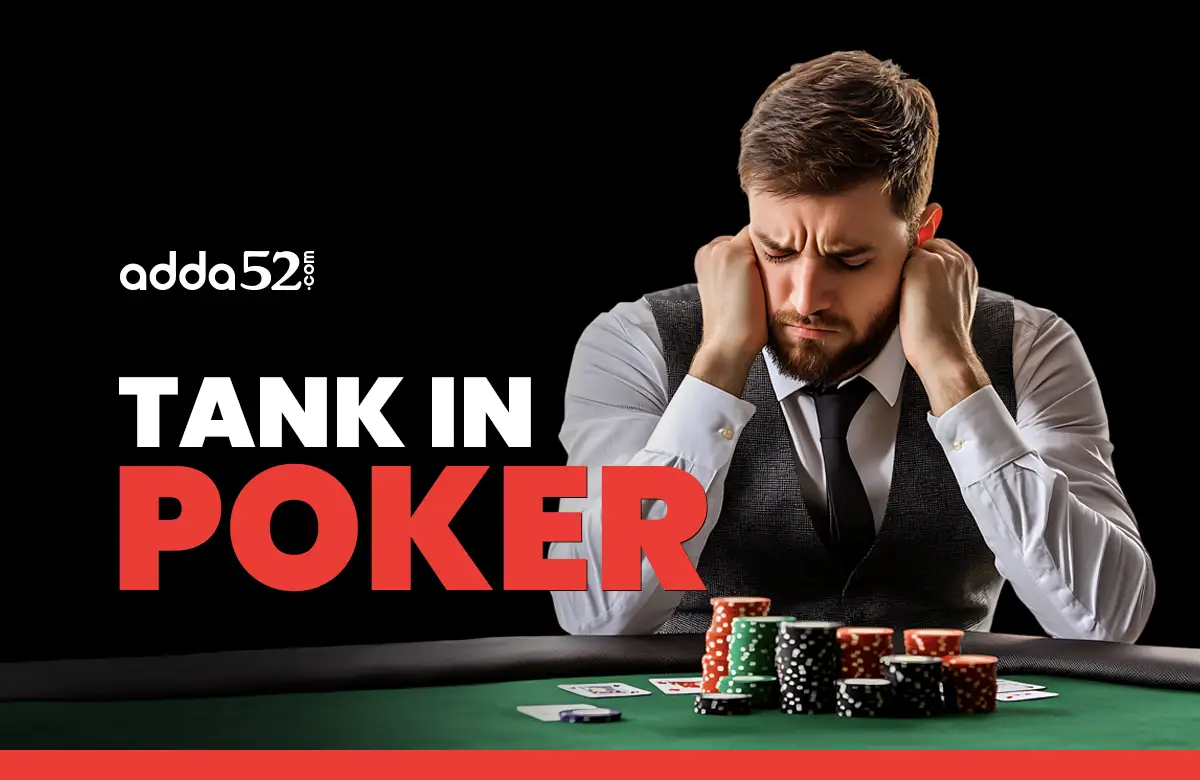
Introduction
Every decision is an opportunity to outsmart your opponents in Poker. Sometimes, those decisions require more than just a quick glance at your cards and chips. Enter tanking—the deliberate act of pausing to think, strategize, and sometimes misdirect. While often misunderstood as stalling, experienced players use tanking to manipulate the flow of a hand and influence opponents’ perceptions.
In this article, we will learn the art of tanking.
What is Poker Tanking?
Tanking refers to when a player deliberately takes an unusually long amount of time to make a decision during a hand. While tanking can sometimes happen out of genuine indecision, it is frequently used strategically for psychological or tactical reasons.
Types of Tanking
Genuine Indecision:
Sometimes, a player tanks simply because they are unsure of their decision. This could be due to complex situations on the board or uncertainty about an opponent’s range. These scenarios typically involve players who are genuinely trying to make the best decision.
Strategic Tanking:
More often, tanking is employed as a strategy. This can serve various purposes:
- To induce tilt: A player may take a long time to make a decision to frustrate or irritate their opponent. This can lead to the opponent making mistakes out of frustration or by becoming overly aggressive.
- To set up bluffing opportunities: When a player tanks for a long time, it can make it appear as though they are struggling with a tough decision. If they later make a large bet or raise, their opponents may be more likely to fold, thinking the player has a strong hand.
- To create uncertainty: A player might tank to confuse their opponents about their hand strength, making them second-guess their decisions and potentially make costly mistakes.
- As psychological warfare: Some players use tanking to exert pressure on their opponents, especially in tournament settings. By taking long amounts of time, they can create a sense of tension at the table, hoping that their opponent will eventually make a decision out of impatience or anxiety.
Avoiding Quick Decisions:
Some players tank to avoid giving away any information about their hand. In poker, acting quickly can sometimes indicate confidence or strength, so taking extra time can obscure the nature of their hand.
Tanking in Tournament vs. Cash Games
In Tournaments: Tanking is often used more frequently in tournament play, especially during crucial stages when the player has more at stake (for example - nearing the bubble, approaching the final table). Tanking in these situations can apply pressure on opponents who may be trying to accumulate chips and advance to the next level.
In Cash Games: Tanking is also common in cash games but is mostly less consequential since players have no specific goal related to tournament progression. However, cash game players may use tanking to manipulate the psychology of their opponents and protect their bankroll.
Is Tanking Ethical?
Tanking can be seen as unethical if done intentionally to -
- Disrupt the flow of the game: If a player is taking excessive time to make a move simply to frustrate others or delay the game, it can be considered disrespectful to fellow players.
- Gain an unfair advantage: In some cases, players might tank in order to influence opponents' decisions or give the impression of uncertainty, attempting to manipulate the game without a legitimate reason for taking time.
However, there are circumstances where Poker tank can be considered acceptable:
- Legitimate decision-making: In situations where a player is faced with a difficult decision, taking time to analyze the hand and consider the best play is part of normal strategic thinking.
- Big pots or high-stakes situations: When a large sum of money or tournament progression is on the line, it's common for players to take their time in order to make the best decision.
Online vs. Live Tanking
Online Tanking: Tanking in online poker is usually much harder to spot than in live games. Many online platforms have built-in time limits, which prevent players from taking excessive time on decisions. Some online players still engage in ‘deliberate delays’, such as timing out intentionally to throw off their opponents or simulate indecision.
Live Tanking: Tanking is more visible in live Poker, and players may intentionally take more time with the hope of influencing opponents. The psychological impact is often greater in live games due to body language and facial expressions, both of which are much harder to manipulate online.
Consequences of Tanking
- Opponent Reactions: If tanking is done too frequently or in a manner that disrupts the flow of the game, it can lead to frustration among opponents. This may cause them to retaliate in various ways, such as by becoming more aggressive, trying to provoke the tanking player, or adjusting their strategy.
- Time Penalties: In some cases, casinos and poker rooms may impose time penalties for players who tank excessively. If a player is consistently taking longer than the prescribed time limit, they may face a formal penalty or be forced to make decisions more quickly.
How to Deal with Tanking
Here are some strategies to manage tanking in Poker:
1. Stay Focused on Your Own Play
- Don't get frustrated: Tanking can be annoying, but getting upset won't help your game. Instead, stay focused on making the best decisions for your own hands.
- Use the time wisely: While the opponent is tanking, take a moment to review the board, your position, and your strategy. This can help you stay sharp and ready for when it's your turn.
2. Keep a Calm Demeanor
- Avoid emotional reactions: If your opponent is tanking to annoy or frustrate you, keeping a calm and collected demeanor will help you maintain control. Avoid showing any signs of impatience or frustration.
- Don't let tanking affect your mental game: If you feel yourself getting upset, take a few deep breaths. Maintaining mental clarity is key to staying ahead.
3. Be Prepared for Delays
- Accept that tanking is part of the game: In tournament play or cash games, some tanking is inevitable. Recognize that not every long pause is a deliberate tactic.
- Control your expectations: Know that some hands take longer than others. If you expect tanking, you can adjust your mindset and be ready for it.
4. Use the Time to Your Advantage
- Analyze the Situation: While your opponent tanks, you have time to analyze their playing style. If they are tanking frequently, it could be a sign that they are unsure of their hand or playing strategically. Observe how they react to certain situations to gather information.
- Mentally Prepare for Your Turn: Think about the potential outcomes, different strategies you could use, and how you will respond depending on the situation. Use this time for mental preparation rather than getting distracted.
5. Keep Perspective
- It’s part of the game: Tanking, while frustrating, is often a part of competitive Poker. Players may take time for various reasons, whether they are making sure they're making the right call or trying to figure out their opponent’s behavior.
- Stay patient: Poker is a game of patience. If you find yourself in a game with a lot of tanking, take it as an opportunity to practice your own patience and decision-making skills.
Frequently Asked Questions
Why do players tank in Poker?
Players tank in Poker for various reasons, including to create uncertainty and manipulate opponents' decisions. Tanking can induce mistakes by making opponents second-guess their hand strength or disrupting the psychological flow of the game. In tournament settings, players may tank to apply pressure, especially when nearing critical stages, like the bubble or final table.
Is tanking against the rules in Poker?
Tanking is not regarded as cheating in Poker, as it is simply a player taking longer than usual to make a decision. However, excessive tanking or deliberate disruptions may lead to penalties, especially in tournament play, where time limits are enforced to keep the game moving at a reasonable pace.
What’s the appropriate limit for tanking in Poker?
The appropriate amount of time for a Poker tank depends on the situation, but taking excessively long to make a decision can lead to frustration or penalties. In most Poker rooms, players are given a set time limit to act (usually around 30 seconds to a minute). Tanking beyond this limit might disrupt the flow of the game.
Conclusion
It is important to balance the use of tanking in Poker, as excessive tanking or slow-rolling can lead to negative consequences. Understanding when and how to use tanking effectively can help you gain a competitive edge, but remember - you should always be mindful of the game’s pace and respect for others at the table.
